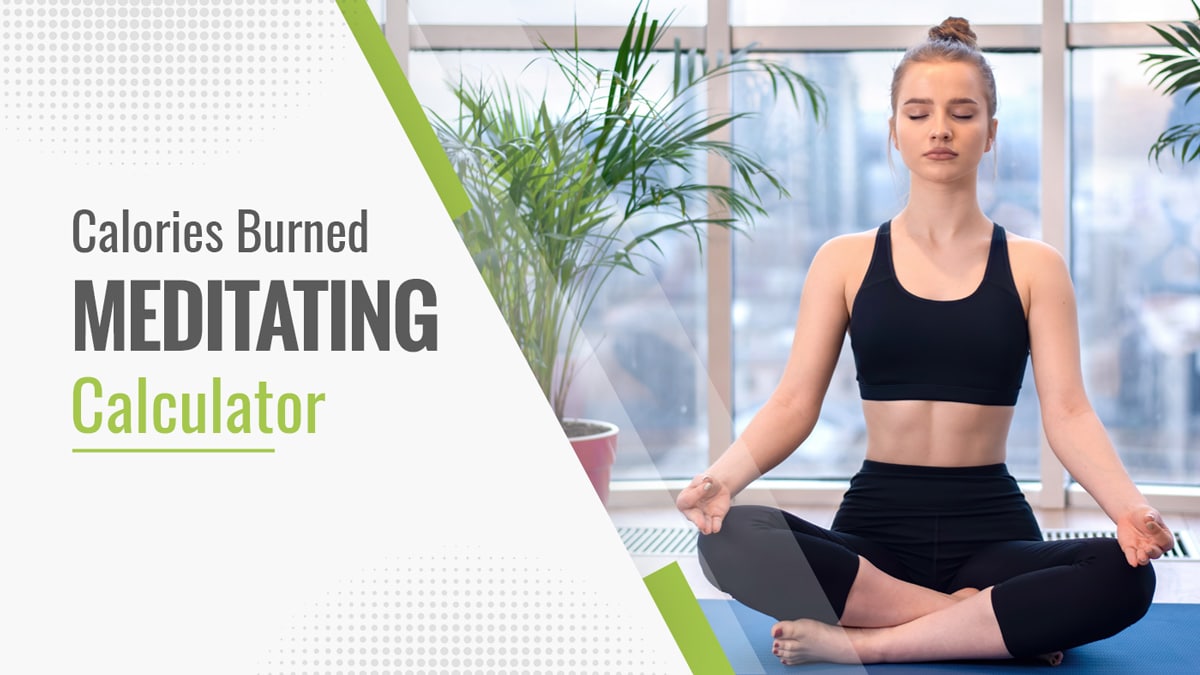The average person weighing 150 pounds burns 71 calories per hour during meditation, the total calories burn depends on the your weight, intensity and type of activity.
While you probably have heard of the power of meditation, you most likely never thought that this mindfulness exercise could burn calories as well. In this article, we will cover exactly what meditation is, its benefits, and how many calories you can realistically expect to burn while meditating.
Meditation has been practiced by ancient cultures for thousands of years. Since there are so many different forms of meditation, it is very easy to get started with some of the simplest forms of meditation.
Mindfulness is perhaps the most common form of meditation, as the easiest way to practice mindfulness is to close your eyes and simply focus on your breathing. All you need to do is clear your mind of all the racing thoughts and focus on breathing in and out slowly. It’s best to practice meditation in a quiet room or outside in nice weather.
While you can burn calories through meditation, it’s typically not the most efficient method of getting exercise. Using meditation in conjunction with a comprehensive workout program allows you to get the physical benefits from exercise along with the mental and emotional benefits that meditation provides.
How To Use The Calculator
Using the calculator to determine how many calories you’ll burn while meditating is easy and only requires a few steps. To calculate the number of calories that you’ll burn, just input your weight and the time that you’ve spent or plan to spend meditating. Then select the meditation activity and hit “CALCULATE”.
Using the calculator step-by-step:
- Choose your unit of measurement (pounds or kilograms)
- Enter your weight in the corresponding unit of measurement
- Find the meditation activity you’re participating in
- Enter the amount of time you’re meditating for
- Hit CALCULATE
How the Calculator Works
Our calculator uses MET values to give you an accurate estimate of how many calories you can expect to burn while meditating and doing other activities. The higher the MET value, the more calories you will burn.
MET (Metabolic Equivalent of Task)
MET stands for metabolic equivalent of task, and MET values allow us to give you an estimated expenditure of energy for many different activities, such as meditation.
A MET value is a ratio between the working metabolic rate and the resting metabolic rate [1], which is the rate of energy that is used relative to the duration of time spent doing activities such as meditating.
So a MET value of 1 is the equivalent of the amount of energy you expend while at rest, and a MET value of 3 means you are expending 3 times as much energy compared to being at rest.
Almost all activities that you can think of have MET values assigned to them. Some activities with MET values are common, and some are not so common. For example, there are MET values assigned to activities like surfing, skydiving, and even painting!
Most activities come with varying levels of intensity and have different MET values assigned to them. However, our calculator uses only one level of activity while meditating
Formula
The formula that our meditation calculator uses to determine the number of calories burned per minute is (MET x bodyweight in Kg x 3.5) ÷ 200.
Examples
A person weighing 150 pounds will burn approximately 71 calories per hour from meditating. This activity has a MET of 1, which means that it burns the same amount of calories as being at rest.
This is what the formula for calculating the calories burned while meditating will look like for a 150-pound individual at a MET value of 1.
- Calories burned (per minute) = (body weight in kg x MET x 5) ÷ 200
- Calories burned (per minute) = ( 68 x 1 x 5 ) ÷ 200
- Calories burned (per minute) = 2 calories x 60
- Calories burned (per hour) = 71 calories per hour
What is Meditation?
Meditation is a collection of different exercises that people use to achieve mental clarity and find an emotionally calm and stable state of being. Meditation has been practiced in various forms throughout history in many different societies and cultures. Meditation is also very common in many of the world’s most-practiced religions.
In fact, meditation is a key component in many of the practices of Christianity, Islam, Judaism, Hinduism, and Buddhism. However, even many people around the world who don’t associate with an organized religion practice meditation for many of the benefits that it provides.
Benefits of Meditation
The benefits of meditation are well-documented and have been proven by many different scientific studies. For example, a 2017 study found that mindfulness meditation improved many different health markers in participants such as chronic pain, depressive symptoms, quality of life, and overall well-being [2].
Additionally, a 2015 study found that meditation is a remedy to stress and has shown positive neurological effects on participants. In this study, meditation exhibited positive effects on the mind, body, and emotions from practicing meditation regularly [3].
While these are scientifically proven benefits of meditation, many proponents of this mental exercise also report benefits such as:
- Better self-awareness
- Stress management
- Increased patience and tolerance
- Enhanced creativity and imagination
- Ability to focus on the present
Frequently Asked Questions:
Is meditation something you can do every day?
In today’s world, meditation is an often overlooked practice that many people think they simply don’t have time for. However, practicing mediation every day will enhance the benefits that you experience. In fact, practicing meditation every day will enhance your productivity and increase your focus and ability to pay attention throughout the day.
How long should I meditate for?
If you’re new to meditation, you should start by focusing on your breathing for five minutes. You may be surprised to find that this can be very challenging as a beginner. Once you’re comfortable with this amount of time, you can gradually increase the length of your meditation sessions and even explore other advanced forms of meditation.
Why is meditation so powerful?
Meditation is so powerful for many different reasons. First, meditation causes a shift in your awareness that allows you to focus your energy on yourself and your presence in the moment. By shifting your awareness, you receive all the benefits that meditation has to offer and can enhance your life in ways that no other exercise can.
What is the best way to get started with meditation?
Meditation is a complex form of exercise with many different techniques and styles. However, most beginners find that the easiest way to get started with meditation is by finding a quiet and comfortable place to sit and focus on their breathing. Try to clear your mind and acknowledge your thoughts, but let them pass and return to focus on your breathing.
The Bottom Line
Practicing meditation for only five minutes each day has been shown to provide many of the benefits that we’ve discussed in this article. With all the different resources out there on meditation, getting started is easier than ever and you can even get started meditating today.
Use our meditation calculator to get an idea of how many calories you can expect to burn while meditating, and be sure to check out all the other calculators that we have to offer at Fitness Volt!
References:
- Jetté, M., Sidney, K., & Blümchen, G. (1990). Metabolic equivalents (METS) in exercise testing, exercise prescription, and evaluation of functional capacity. Clinical cardiology, 13(8), 555–565. https://doi.org/10.1002/clc.4960130809
- Hilton, L., Hempel, S., Ewing, B. A., Apaydin, E., Xenakis, L., Newberry, S., Colaiaco, B., Maher, A. R., Shanman, R. M., Sorbero, M. E., & Maglione, M. A. (2017). Mindfulness Meditation for Chronic Pain: Systematic Review and Meta-analysis. Annals of behavioral medicine: a publication of the Society of Behavioral Medicine, 51(2), 199–213. https://doi.org/10.1007/s12160-016-9844-2
- Dunlop J. (2015). Meditation, stress relief, and well-being. Radiologic technology, 86(5), 535–559.
Tip: If you're signed in to Google, tap Follow.



















